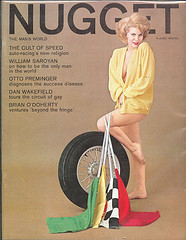Today saw a bumper crop of weak content masquerading as journalism. I’m really perturbed about one article in particular.
Forbes—the business magazine led by zillionaire libertarian CEO and editor-in-chief Steve Forbes—published an article noting that NPR’s reporting had a gender bias in its sourcing. The report was written by contributor Michael Howe, whose bio at Forbes characterizes him as the “lead shepherd of the 4th Estate Project.” The 4th Estate Project released several interesting studies, including one last June detailing the media’s overall gender bias in using women as news sources for election coverage. It was a laudable effort in concept to encourage awareness of diversity in media.
The 4th Estate Project continued to follow NPR’s coverage through the election season to watch for gender bias. In a nutshell, the bias noted across other commercial outlets in frequency of quoting males over females also appears in NPR’s coverage. Not a good thing, on the face of it.
But there are problems with this particular report in Forbes and 4th Estate Project:
1) The magazine has an inherent gender bias of its own, not spelled out clearly by contributor Howe. With the overwhelming majority of medium-to-large corporations in this country lacking female board members and even fewer CEOs, Forbes’ own sourcing for business news is automatically biased by the current structure of this country’s businesses.
[Which begs the question: Is it at all possible that reporting on elections is similarly biased, because there are too few women in government or in politics? 4th Estate Project may have screened out statements by candidates, but did they screen out statements from past office holders, or prospective candidates who were assisting then-prospective candidates?]
2) Forbes’ editor-in-chief has a known bias as a libertarian conservative (though he once ran for president under the GOP); his ideological bent against taxes may manifest in a bias against NPR as a publicly-funded news outlet. Howe’s piece does not disclose Forbes’ ideology or the possibility that the magazine has a similar bias; he doesn’t appear to question why Forbes magazine would be so interested in coverage of this single outlet’s continued performance up through the November election after the 4th Estate Project’s June 2012 report.
3) NPR is a competitor to Forbes; they may not operate in exactly the same market niche, but they both do reporting on business and politics. In this particular piece by Howe, Forbes questions the diversity of a single competitor, yet we can only assume that Howe and Forbes both believe their readers fully understand this relationship.
4) There’s nothing under the About Us page at the 4th Estate Project’s website in terms of funding disclosure. It’s not clear if this is a privately-funded, corporate-funded, or public grant-funded project. How can we tell if this entity has an agenda of its own? The widely disseminated graphic based on the June 2012 gender bias report cites major newspapers, media companies, and news shows, but nowhere among them is Forbes magazine listed. Is it at all possible that Forbes is a funder of 4th Estate Project — or at arm’s length, through any related entity? We can’t rule it out based on the dearth of information.
This isn’t a little matter when many races across the country during this last general election hinged on women’s issues. The June 2012 report questioned the credibility of all election reporting based on possible bias; who was funding this report and why?
5) Lastly, the term “sourcing”—as tackled by 4th Estate Project’s June 2012 report and the article in Forbes magazine—is used in reference to persons quoted in news reports. However sourcing can mean something much broader. As a former managing editor it meant something different to me; my standard for vetting a news story required at a minimum one source on the record, and an unimpeachable source off the record. An unimpeachable source might have been a woman reluctant to go on record—and I know for a fact this happens frequently. Did 4th Estate Project’s June 2012 report and Howe’s article in Forbes fully explain and differentiate this to readers?
And is it possible the real story that women in the U.S. may not feel safe being publicly quoted?
Unfortunately we can’t tell that from either the 4th Estate Project’s previous work, or from the article in Forbes. Howe doesn’t question whether women quoted more frequently by NPR’s Mara Liasson might have felt more secure talking with another woman than with Ari Shapiro because he’s a man. (No slight to Shapiro who seems like a nice chap, but some women may feel reluctant talking openly to any man, or being quoted and named publicly by a man.)
While we ponder these challenges, Forbes magazine readers continue to think NPR is gender biased, their perceptions poisoned once again about publicly-funded news outlets.
That’s a two-fer for Steve Forbes: knock a taxpayer program and a competitor at the same time. What a bargain.
